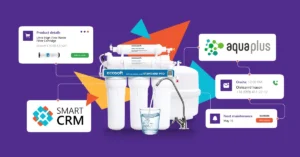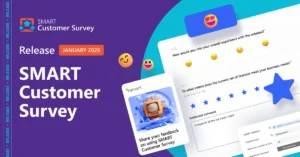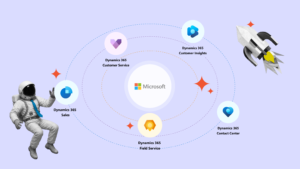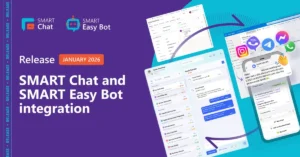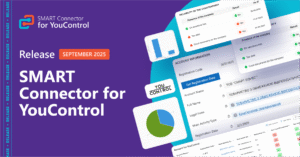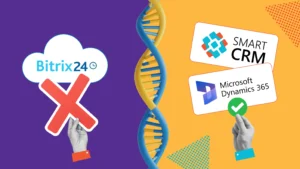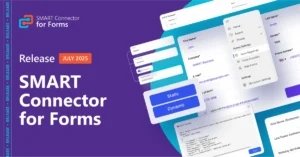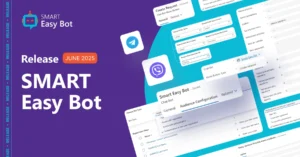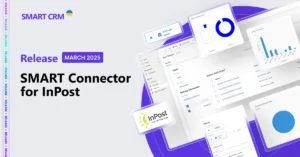Growth Point: How Ukrainian Integrator Seeton Transformed Its Sales System with Dynamics 365 Sales

Seeton is a leading Ukrainian systems integrator with over 20 years of experience in delivering cutting-edge IT solutions for businesses and the public sector. Since 2021, the company has also expanded its operations to Azerbaijan. With a portfolio that includes partnerships with 90 global vendors and more than 1,000 successful projects, Seeton provides a comprehensive suite of services across telecommunications and engineering networks, IT infrastructure, virtualization, cloud solutions, and cybersecurity.
- Industry: System Integration (IT and Cybersecurity)
- Employees: 100+ experts in Ukraine, 20+ in Azerbaijan
- Country: Ukraine, Azerbaijan
- Website: Seeton.pro
Among Seeton’s clients are major Ukrainian enterprises and public institutions, including Astarta, Darnytsia, the State Customs Service of Ukraine, DTEK, Parkovyi Data Center, lifecell, Naftogaz of Ukraine, the National Bank of Ukraine, PrivatBank, PUMB, Raiffeisen Bank, Vodafone, and many others. For three consecutive years (2022–2024), Seeton has been ranked #3 among the TOP 35 systems integrators in Ukraine and #24 among all 2,118 Ukrainian IT companies by revenue, according to the DIGITAL TIGER 2024 report.
Today, Ukrainian business is more than entrepreneurship – it’s about resilience, collaboration, and support. Amid the ongoing war, businesses in Ukraine have become economic, humanitarian, and digital pillars of the country. Rather than working in isolation, many companies openly share their experiences, support one another, and unite toward a common goal. This spirit of cooperation is evident in numerous regular industry events such as RAU EXPO, which shapes the future of retail and development; Svoe.IT, a platform for promoting solutions by Ukrainian developers; the Entrepreneurs’ Forum, which brings together companies building a competitive business despite all odds; and dozens of other specialized events organized by the IT Ukraine Association, the European Business Association, and the U.S.-Ukraine Business Council.
The Ukrainian business community thrives on collaboration and synergy – both local and international. The partnership between SMART business and Seeton is a shining example of mutual trust, shared expertise, and technology that not only meets modern challenges but creates real opportunities for growth. So how did the implementation of Dynamics 365 Sales unfold? Learn all about it in this new success story.
Key Prerequisites for Implementing a CRM System and the Specific Processes It Had to Support
Seeton was looking not just for a CRM system but for a solution that could become part of the company’s unified IT ecosystem. At that time, Seeton was already expanding its presence in international markets, so the team needed a scalable solution.
While searching for a CRM system, the company defined several key criteria:
- Compliance of the software product with international standards.
- Availability of best practices and time-tested approaches that had proven effective in companies around the world.
- Alignment with the company’s allocated budget.
- Flexibility and customization capabilities to match the company’s specific processes.
- Availability of an experienced partner who could support the implementation and provide long-term assistance.
We were looking for a vendor that would not just implement the system but also adapt it to our needs and provide long-term support throughout the partnership. A solution can have a wide range of features, but it’s like a first-class car – if your country doesn’t have an official service center, the first breakdown makes it unusable. SMART business, as a Microsoft partner, met all our requirements and helped us through the integration journey with our needs in mind
The company’s primary goal was to align all automation processes. The finance department had already been considering a budgeting system and ultimately chose a Microsoft solution. Therefore, when the time came to select a CRM system, choosing Dynamics 365 Sales was a logical step – as the system could be easily and quickly integrated with the broader Microsoft stack.
Another important factor for the company was finding a CRM that could handle non-standard business processes. Seeton’s sales cycle does not follow the classic “lead – deal – contract” model. Instead, it’s a complex, multi-level process that includes compliance checks, approvals, tenders, presales, testing, integrations, and support. Therefore, the CRM system needed to be flexible, adaptive, and capable of handling a wide range of unique scenarios, including:
- Presales functionality: lead identification, proposal creation, presentation preparation — with mandatory tracking of each step.
- Tender-related processes: capturing incoming requests, preparing and approving proposals, financial planning, etc.
- Detailed sales classification by business area: Seeton operates in several business directions, offering a variety of solutions, as well as its own services.
- Integration with the DMS (Document Management System) for consolidated document handling.
- Data transfer to the financial accounting system to build accurate Pipeline & Forecast.
- Automation of notifications — for example, alerts when interaction with the financial system or accounting is required (e.g., a reminder to perform a specific action).
And most importantly – the future system had to be built so that every next key step in the sales process would only become available after the previous one was completed. There should be no option to “skip” an important stage. It’s not about control for control’s sake – it’s about data quality, predictability, and the efficiency of a clearly structured process.
Implementation of Microsoft Dynamics 365 Sales: How the Solution Was Integrated into Seeton’s Workflows and Whether It Met the Customer’s Key Requirements
As with any large-scale transformation, the technical component was just the tip of the iceberg. The main challenge, as always, was the human factor – people don’t always embrace change easily. However, Seeton applied a time-tested tactic based on leading by example. Strong involvement from the leadership team, transparent project stages, and the experience of the team lead – who had gone through similar transformations in international companies – helped employees quickly adapt to the new system. At the same time, the SMART business team, responsible for implementation, acted not as a mere outsourcer but as a true partner from day one.
The implementation process was built on open dialogue: the Seeton team freely shared their boldest ideas and vision, while SMART business specialists looked for the best ways to bring them to life. Since the customer had its own approach to sales, with unique business rules, the Microsoft Dynamics 365 Sales solution was customized to more precisely automate Seeton’s internal processes. This approach made it possible not just to deploy standard functionality but to tailor it to the company’s specific workflows that were already in place.
While working with SMART business, we experienced clear organization at every stage. The project followed the plan – with no delays or misunderstandings. All issues were resolved promptly and professionally. The SMART business team used their own expertise to suggest alternative solutions that simplified the process and made it more efficient. Thanks to this proactive approach, our entire collaboration was smooth and effective
As a result, the implementation of Microsoft Dynamics 365 Sales successfully addressed a number of key requirements defined by the company:
- Scalability and fit for business size – Dynamics 365 Sales provided a scalable architecture that supports the client’s complex sales processes and allows the system to evolve with future challenges.
- Mobility and work on the go – With a fully functional mobile interface, Dynamics 365 Sales gave the sales team the flexibility to work efficiently from both desktops and mobile devices.
- Digital discipline and pipeline control – The CRM helped not only track manager activities and interaction history but also foster structured work habits. The system supported a disciplined approach to potential deals, reporting, and process control at every sales stage.
- Regular reporting and transparency for investors and leadership – Dynamics 365 Sales made it easy to visualize data for weekly reports (dashboards), pipeline and forecast updates, and provided clarity for both the team and the supervisory board, enabling better-informed decisions.
- Unified ecosystem for end-to-end process automation – Thanks to its integration with other Microsoft products, Dynamics 365 Sales became part of a consolidated digital environment. The goal was to unite CRM, document management, finance, and analytics into a single, cohesive IT ecosystem.
The automation of sales processes helped the team achieve one of the main goals of the implementation: to shift focus away from routine tasks and toward deeper customer engagement – because personalized customer experience has always been a top priority for Seeton.
Our main advantage lies in our personalized approach to every client. We work with companies across various industries – from telecom, banking, and manufacturing to the public sector – and there’s no one-size-fits-all solution. We don’t aim for what’s most convenient for us ‘here and now’ – we strive to help clients find effective solutions, both economically and technologically, that serve their goals and growth strategies. For us, long-term cooperation built on professionalism and mutual trust is key. Dynamics 365 Sales supports our approach on the technical level, enabling the company to precisely track every step of a deal and respond to client requests in real time – planning and managing projects quickly, flexibly, and effectively
Implementation Results and Future Plans of the Seeton Team
As of April 2025, Seeton reports significant improvements in its sales processes following the implementation of Microsoft Dynamics 365 Sales. Beyond the fact that the system is now fully integrated into the day-to-day workflows of the sales team, the company has seen shifts in both its data culture and its team management practices.
Following the launch of Dynamics 365 Sales, Seeton gained several key benefits:
- Full visibility into the project portfolio
Previously, evaluating the status of each implementation required time-consuming data gathering and analysis. Now, with the Dynamics 365 Sales CRM system in place, it’s easy to track every project stage – from initial technical assessment to go-live. This allows for immediate identification of delays and eliminates blind spots in client interactions. - Top-down sales analytics
Managers and executives now have a real-time understanding of what solutions and services were sold, to whom, and how sales performance compares to targets in Ukraine and other markets. Consolidated dashboards display deal breakdowns by region, business area, and sales stage – all accessible in just a few clicks, whether on desktop or mobile. - Forecasting and risk management
Clear visibility into sales and project pipelines helps predict potential risks and forecast new deals, enabling Seeton to balance its portfolio and manage the workload of project teams more effectively. - Faster decision-making for top management
Instead of spending hours compiling reports, executives can view all key metrics in a single dashboard. Mobile access ensures that the necessary insights are always within reach.
In addition, Seeton is currently implementing two more solutions: SmartPoint DMS for automating document management processes and the budgeting module of Microsoft Dynamics 365 Finance and Operations Applications.
It’s important to understand that a CRM system is not a magic wand that instantly boosts sales.
It is, first and foremost, a tool in the hands of people – a means to achieve defined goals.
The implementation of Dynamics 365 Sales has helped our team build the necessary discipline in a fast-paced environment, become more efficient and agile in daily operations, and gain the transparency we needed to understand where we are and what the next steps should be to ‘make it all work.’ And that’s exactly what we were aiming for
It is incredibly inspiring that Ukrainian companies, every single day – despite the war, losses, uncertainty, and the enormous strain on everyone from owners and executives to line managers – continue to move forward. That they find the strength and motivation to evolve and become better: for themselves, their teams, their customers, and ultimately – for the country.
Today, Alan Deutschman’s phrase ‘Change or die’ resonates with us more than ever – and I’m happy that Seeton chose our company as a partner in these changes, entrusting us with the implementation of digital transformations that truly work.
We sincerely thank the Seeton team for their deep involvement in the project and for understanding the importance of a holistic approach – one that can be achieved through the Microsoft ecosystem, SMART business solutions, our expertise, and the Customer’s clear understanding of the automation requirements
The completion of the Microsoft Dynamics 365 Sales implementation became a new starting point for Seeton’s continued growth. The company firmly believes that sustainable success is impossible without prioritizing what matters most – people. Without clients, there is no business; and without a strong team, there are no clients. That’s why Seeton focuses not on short-term wins but on long-term quality – listening to its employees, developing their skills, prioritizing essence over quantity, and building its reputation through genuine engagement and care.
This is why it’s crucial to choose solutions that simplify work while improving the quality of every client interaction – allowing the team to focus more on delivering value and less on routine.
SMART business helps companies find solutions that drive results – from the first lead to predictable growth.
